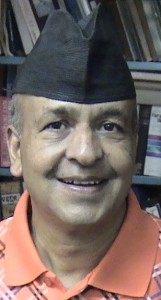
“Nepal is an independent, indivisible, sovereign, secular, inclusive, democratic, socialism-oriented, federal democratic republican state.” Thus states Part 1, article 4 (1) of the Constitution of Nepal 2015. Then comes a strange statement. “Explanation: For the purposes of this Article, ‘secular’ means religious, cultural freedoms, including protection of religion, culture handed down from the time immemorial.” In Nepali, the constitution uses the word “sanatan” which we believe represents “from the time immemorial”.
Preliminary comments
A prominent writer like Aditya Man Shrestha has argued that the inserted explanation takes back what the word “secular” intended to give. The word “secular” can mean “relating to the doctrine that rejects religion and religious considerations”. The new constitution, on the other hand, devotes itself to the “protection of religion, culture handed down from the time immemorial.” Which is that religion?
From time memorial
Only Buddhism can claim to have its birth in Nepal. Does the new constitution guard that as the “sanatan” religion? Our Buddhist friends will say no. Buddhism has suffered persecution. The south Indian priest Sankaracharya’s visits to Nepal between 788-820 AD brought disaster. In Fatalism and Development, Dor Bahadur Bista writes, “Buddhist institutions were attacked and the products of their work destroyed, with widespread book-burnings. These included not only religious texts, which may have been seen as rivalling Sankaracharya’s version of Saivitic thought, but also other secular literature, works of grammar and dictionaries.” The persecution of Buddhists continued till the Rana time.
In our country, no religion can claim to have its followers “from the time immemorial”. One religion entered India from Iran probably around 1800 BC, and its advocates brought it to Nepal. Buddha was born in time memorial, probably around 600 BC. Capuchin missionaries brought Christianity to Nepal; but Prithvi Narayan Shah expelled them in 1769, and with them modern medicine and education which the missionaries took to Bethiya. Indian masses benefited from up to date medicine and education much later, only from the time of Queen Victoria.
If Buddhism does not qualify as the “sanatan” religion, no other does because they have all entered from outside during time memorial. A constitution that aims to protect one religion is not secular. Rather, it exposes the weakness of that religion which needs state protection to survive.
Encouraging the caste system
Another article in the constitution further erodes the secularity which 4 (1) talks about. Article 26 (3) states, ” No person shall, in the exercise of the right conferred by this Article, do, or cause to be done, any act which may be contrary to public health, decency and morality or breach public peace, or convert another person from one religion to another or any act or conduct that may jeopardize other’s religion and such act shall be punishable by law.”
Believe it or not, conversion in all areas takes place all the time in all societies. A student writing her SLC proves that she has converted to a higher level of education. The son of a prominent Nepali actor converted his sex and returned as Miss So & So. Nepali politicians are converting their beliefs all the time. Our foreign minister Kamal Thapa has converted his beliefs three four times to achieve his present status. Religious conversion, like other changes, is so entrenched in human nature that it will take place whether the state likes it or not.
Further, article 26 (3) of the Constitution of Nepal 2015 goes against Article 18 of the UN Universal Declaration of Human Rights which states: “Everyone has the right to freedom of thought, conscience and religion; this right includes freedom to change his religion or belief, and freedom, either alone or in community with others and in public or private, to manifest his religion or belief in teaching, practice, worship and observance.” Nepal sends its army to serve in the UN peacekeeping force. It better observe Article 18 of the Universal Declaration of Human Rights in its totality.
One of the writers of the Indian constitution, Dr B R Ambedkar, converted to Buddhism because he wanted to avoid the caste system prevalent in religions around him. He found no other way to remove its shackles. By trying to restrict conversion, Nepali Brahmin and Chhetri lawmakers do not want our Dalits to escape the prisons of their low castes. No wonder caste still prevails, and Nepal remains undeveloped.
Another Panchayati criminal code?
Section 9 article 156 of the proposed bill on the criminal code leaves no doubt that the present legislature intends to delete practical secularism from the present constitution. In four parts, it states: “(1) No one should convert other’s religion or do it in an organized way or incite it. (2) No one should act or behave in way that disturbs the traditional religion, belief or faith in any caste, ethnic group or denomination, or to convert to another religion with or without enticement that disturbs, or with any other intention – such religion or belief should not be preached. (3) Anyone committing offense as per Clause (1) and (2) shall be imprisoned for five years and fined up to 50,000 Nepalese Rupees. (4) If the offender as per Clause (1) and (2) is a foreign national, s/he should be repatriated from Nepal within seven days of completing the imprisonment according to this Article.” Only King Mahendra’s ghost could have inspired this.
Citizens have till April 12 to comment on the proposed bill. People like Sashank Koirala, Khum Bahadur Khadka, Baburam Bhattarai, Kamal Thapa, and others who want to remove the word “secular” from the constitution and those who would like to see this bill passed should realize that such actions will encourage religious minorities to fight in international courts. Then, Nepali Narendra Modis can issue joint statements with David Cameron and EU leaders that the 2015 constitution lacks inclusiveness.
Kathmandu Post published a very diluted version of this article on April 10, 2016.
Please see http://kathmandupost.ekantipur.com/news/2016-04-10/not-really-secular.html
This is the original.
Ramesh Khatry





















Discussion about this post